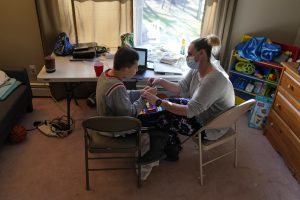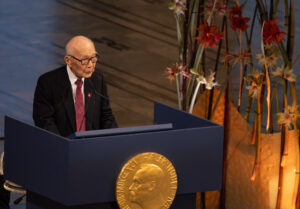When Frances Terrell was first approached about participating in a reparations program the Virginia Theological Seminary had been working on, she said she experienced an emotional cocktail of surprise and elation.
Though she heard murmurings that the seminary had been in talks about distributing cash payments to the descendants of enslaved people who helped build the 198-year-old institution, Terrell said she didn’t expect anything to come of it.
“This is something that has been spoken about, or we’ve seen it every once in a while … but it never came to fruition. This is the only time that we are aware of it actually getting into practice,” Terrell said.
Since February, in an effort to recognize the enslaved people and Black people who worked for little to no money during the Jim Crow era, the seminary has been distributing cash payments of $2,100 to the generation nearest the original workers.
Now 78, Terrell is the granddaughter of Mary Frances Simms and Frederick Douglass Johnson, who met and fell in love while working together at the seminary in the 1920s. Simms was born in Alexandria and lived on King Street, attending the Episcopal School at Fort Ward. Established by freed slaves, it was the only vocational school in the area before the seminary opened.
Johnson was from Orange County, Virginia and performed custodial work at a church “very much like” the seminary but later worked at the seminary’s Episcopal High School, Terrell said. The two eventually married and had several children, one of which was Lucian Johnson, a lifelong Alexandria resident and Terrell’s late father.

With roots deeply entrenched in the city, Terrell carries on the family line. In one of the country’s first cash reparations programs of its kind, she will now be compensated annually for her grandparents’ labor.
“[I’m] absolutely, totally and completely delighted about [the program],” Terrell said.
Although payments only started going out in February, the reparations program had been in the works for some time. Reverend Ian Markham, dean and president of the seminary, proposed the idea two years ago as a way to holistically tell the institution’s story as it approaches its bicentennial in 2023.
In September 2019, the seminary announced the creation of a $1.7 million endowment fund reserved exclusively for reparations. The money would be spent on, among other things, the needs emerging from local congregations and descendants of enslaved workers, lifting up Black clergy in the Episcopal Church and various activities to promote social justice.
The seminary’s Office of Multicultural Ministries then assembled a team of researchers and genealogists to gather historical documentation of Black people who worked at the institution between 1823 and 1951. According to the seminary’s website, this process involved conducting oral history interviews with family members of enslaved people who worked on the campus and combing through institutional and public records. So far the seminary has identified 15 descendants who will be receiving payments.
Because Alexandria held a sizable free Black population that worked as contractors for low wages, the program encompasses descendants of all Black people that worked at the seminary before and after the Civil War. The cash payments are free of conditions or caveats and are not tied to any semblance of a scholarship program, according to Markham.
“It’s important to do this work not just for the seminary but also the city,” Markham said. “The temptation is to try and forget. The obligation is to learn and respond to the true reality of the past, for this is the only way to create a different future.”
Through the reparations program, formal apologies and the recent implementation of a diversity task force, the seminary has spent the last decade exploring avenues for racial reconciliation.
However, Ebonee Davis, the seminary’s associate for programming and historical research for reparations, indicated that these atonements mark the beginning of a long road; they’re in no way intended to try and fix the problem overnight.
According to Davis, several families in the community have long had “bad blood” with the seminary due to not only its segregated and racist history, but also a perceived recent lack of outreach to the local Black community. For some residents, it has left them feeling unwelcome in their own city.

In fact, according to Davis, one descendant she contacted a few months ago didn’t realize the seminary hired Black people.
“She was like, ‘I can’t believe that you’re Black and in administration. I didn’t know they were doing that,’” Davis said. “It’s been two different worlds, and it’s been very clear [to] their community [that they] could only enter this community if they were serving this community, and that was it. So we’re hoping to change that.”
In addition to the cash payments, the seminary has provided descendants with cards to utilize the amenities on campus whenever they want. One descendent recently threw a birthday party at the seminary, and others like to come in and walk around the campus “in a way that their ancestors never had the freedom to,” Davis said.
Terrell, who lives on Quaker Lane, can see the seminary from her window and said she occasionally likes to take a stroll inside.
Davis emphasized that the seminary is not attempting to tell people how to feel, but rather, aiming to move beyond simply learning its history and into the realm of deliberate atonement.
“Everybody is more than welcome to receive this as they feel. We’re not in the position to tell you that you should be happy this is happening or upset,” Davis said. “ … I think if the seminary is truly being intentional, then that’s what’s important and over time we’ll see what happens.”
The program has garnered a bit of resistance from members of one family who originally declined the cash payments and later changed their mind. But according to Davis, the overall response has been largely positive. The goal, she said, is to create a relationship between the seminary and the city’s Black community.
“Even though the [money] is not a lot, it’s a start. We’re hoping that because the process of doing reparations is so personal – we’re speaking to every single person and hearing their stories; there are conversations being had that were never had in the past … [this] will help build those relationships,” Davis said.
John Chapman, who serves on City Council and owns Manumission Tour Company, which sheds light on the city’s Black history, called the seminary’s initiative and leadership “refreshing” and encouraged other organizations to follow suit.
“This is a great opportunity for this organization to really look at giving back what they owe to the descendants [whose ancestors] built the campus,” Chapman said. “I think everybody knows the history around it, and if they don’t, they have an opportunity to learn it. If we’re talking about racial justice, if we’re talking about reconciliation, this is how you do it.”
For Terrell, who has six grandkids, the cash payments are as much about investing in her children’s future as they are about her family’s history.
“This represents the fact that finally, finally someone is willing to recognize what we did back in the day, back in the Civil War and after the Civil War. We didn’t have a choice back then,” Terrell said. “So, really, it’s wonderful that they are respecting us enough to want to recognize us.”




